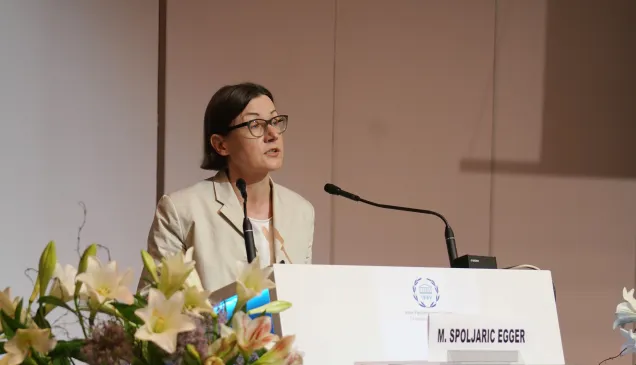As delivered by Tilman Rodenhäuser, ICRC Thematic Legal Adviser
Distinguished Chair, Excellencies, Ladies and Gentlemen,
The ICRC is grateful for the opportunity to participate in this second round of informal meetings of the Open-Ended Working Group.
As discussions are progressing, the ICRC would like to submit to delegations a number of considerations which we hope will be useful for delegations when developing and discussing the final report.
Over the past months, international humanitarian law was discussed by many delegations. A number of important points have been raised.
Foremost among these points is the insistence by delegations that international humanitarian law applies only during armed conflict. Indeed, from a legal point of view it is uncontroversial that IHL rules on the conduct of hostilities do not apply in peacetime. Only some rules of IHL apply and are highly relevant even prior to conflicts, such as the obligation to States parties to Additional Protocol I to determine – in the study, development, acquisition or adoption of a new weapon, means or method of warfare – whether its employment would, in some or all circumstances, be prohibited by this Protocol or by any other rule of international law applicable to the High Contracting Party.
Delegations have also raised concerns that it is unclear when hostile cyber operations carried out in times of peace will trigger the application of IHL. The ICRC agrees that this is a challenging question that States need to address. However, we should also be clear that if an armed conflict exists and IHL applies, this body of law restricts all means and methods of warfare, be they old or new, traditional or cyber. For the civilian population, it makes little difference whether water supply or medical treatment is cut through bombing or disabled through cyber operations.
A number of delegations have also stressed that the international community should focus on preventing cyber warfare, not regulating it. Delegations have raised concern that IHL may be abused in political debates and provide excuses or justifications for an unlawful use of force in international relations. The ICRC understands this concern. We have consistently emphasized that the prohibition against the use of force under the UN Charter must be respected. But we also call on you to affirm that in the unfortunate event of war, IHL is the last layer of legal protection for victims of armed conflicts, including against cyber operations. The current draft report contains strong language on these issues. The report stresses that IHL reduces risks and potential harm to both civilians and combatants in the context of an armed conflict. It also highlights that IHL is not legitimizing any resort to conflict. We hope that delegations can achieve consensus on including these points in the final report.
Importantly, delegations have called for more clarity on how IHL applies in cyberspace. The initial draft report states that more discussion among States is needed on how the 'principles of humanity, necessity, proportionality, distinction and precaution, apply to ICT operations in the context of armed conflict'. The ICRC agrees that there are certain open questions on how to apply these principles during armed conflict. But States have the means to provide further clarity on these questions – though multilateral dialogue, voluntary guidance notes, and capacity building. And if gaps are found to exist, new law may be needed to complement existing rules. The ICRC stands ready to work with States to address these challenges.
While dialogue on how international law applies in cyberspace needs to continue, we emphasize that existing law affords a number of clear and important safeguards for the protection of civilian populations: There have been reports of cyber operations targeting civilian infrastructure, such as industrial plants; cyber operations targeting water networks; and disrupting hospitals – with a first casualty as a result of a cyber attack reported two weeks ago. During armed conflict, IHL prohibits any attacks against all these civilian objects. It also more specifically prohibits cyber operations against objects indispensable to the survival of the civilian population, such as water installations; and against medical facilities.
Many delegations have stressed that cyberspace is not a lawless space. In line with this assertion, the ICRC calls on all States to affirm that civilians and civilian infrastructure must be protected against the effects of cyber operations during armed conflict, and to effectively implement their obligations, in accordance with international humanitarian law.
Thank you.


